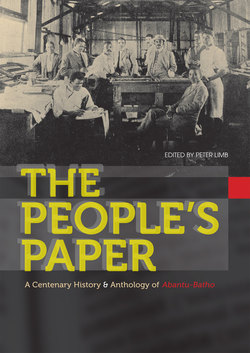Читать книгу The People’s Paper - Christopher Lowe - Страница 24
На сайте Литреса книга снята с продажи.
WAR
ОглавлениеCongress was not alone in adopting a moderate policy during World War I. The black press in the United States similarly faced dilemmas of either continuing protests or aiming at reforms incumbent on their loyalty.150 Abantu-Batho, given meagre resources and state policy, could not have reporters at the front, but commented on war issues in general and as they affected Africans.151 It provided a forum for critics of war policy and returned soldiers to expose their exploitation by white officers. In 1916 editor Grendon hoped that Botha would allow black South Africans to be active participants in the war,152 but this did not eventuate. Abantu-Batho questioned why General Hertzog could publish seditious statements in the dailies: ‘in no other part of the brutish Empire would politicians be allowed to carry on such a propaganda.’153 In contrast, when Seme in January 1916 had published a sharp commentary on war events (see Part II), he was dragged before government officials and threatened, his chief crime being perhaps his sarcasm in reporting that the British had ‘had enough’ of war and that their government was ‘in a state of chaos’. To add insult to official injury, he intimated that Africans should ‘expect any day that [King] George will ask you to go and assist’ – in which case they should be led by King Solomon Dinuzulu.154
Benjamin Phooko of the TNC and member of the paper’s editorial board drew attention to the contradiction between calls for Africans to support the war and the government’s denial of full black war involvement. Phooko sarcastically commented:
One can easily deduce that if our father King George has been desirous of obtaining the assistance of his children, the natives, then our Stepfather, the Union Government, must have been certainly misusing the instructions of our father as we have been made to believe that this war is one which has its origins among the white peoples … and the Government is anxious to avoid the employment of natives in warfare against whites; yet after a short space of time we find the very same Government changing its mind …. Still more painful to us, it should be remembered … dogs and beasts were being employed … and also natives from different parts of Africa had a share.155
The paper quoted veterans that the treatment of South African Native Labour Contingent (SANLC) labourers in France was ‘brutal and barbarous’.156 Emboldened by Abantu-Batho’s coverage, they were prepared to ‘corroborate the statements of those who complain of ill-treatment’, specifying ‘compounds where our people were housed’ that ‘were like prison’ and exposing the shooting dead of four African soldiers on 23 July 1917.157 Here, Abantu-Batho clearly functioned as a ‘paper of the people’, providing a forum for dissent.
In these war exposures editors intervened directly. Mvabaza linked the protests to democracy, editorialising that African war sacrifices were made against a back-drop of continual references to ‘democracy and freedom’ by ‘the British and white people of this land’ who ‘should redress our grievances and give the freedom for which we lost thousands of men’.158 Letanka added a defence of African honour: ‘We expect to be rewarded for our work after the war when prizes are distributed to the brave.’159 He wrote – as Grundlingh notes, without naivety – to greet the declaration of the Allies in favour of self-determination of small and oppressed nations as a ‘message of hope that the dawn of freedom is at last breaking forth’.160 Soldiers in France also got hold of Abantu-Batho. Daniel Hafe, a Natal teacher, wrote to Ilanga in 1917 that he was outraged to read reports in Abantu-Batho that some white people were still opposed to black recruitment and that magistrates had called for returning black troops to be replaced by white soldiers.161
Looking back a decade later, the weekly characterised the war as ‘a cowardly, brutal and unholy dog fight into which the black races of the world were drawn’. Now the blatantly unjust policies of Nationalist minister Oswald Pirow meant that South Africa was ‘fast qualifying for the next world imbroglio’. In support, it cited W. E. B. Du Bois, African American editor of The Crisis: ‘Self government for Black People must become the aim’, or else South Africa ‘is going to become an outcast among the nations.’162
Abantu-Batho columns reveal another interesting political influence of the war. A report of July 1918 stated that, following the physical threat of police and hooligans exerted on black strikers, a Congress meeting in Vrededorp would be ‘guarded by our men from France. They will be in full uniform’ under the charge of a sergeant.163 After the war, it reported the inaugural meeting of the Mendi Memorial Club.164 Loyalty themes persisted after the war. Henry Reed Ngcayiya related a history of ‘unswerving’ loyalty in wartime, when Congress had ‘complacently shelved’ all African grievances. Yet despite their war service, the king’s speech to SANLC members in France, when he acknowledged their role and loyalty, and the tragedy of the SS Mendi, the Act of Union remained ‘a great monster against their liberties’.165 In 1926 Abantu-Batho commented that World War I commemorations in France meant that ‘the worthy contribution’ of ‘loyal Bantu subjects of the Crown was not being completely forgotten’.166
